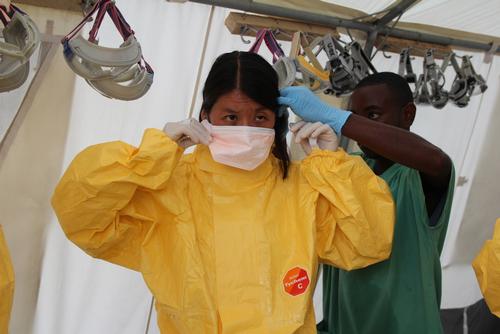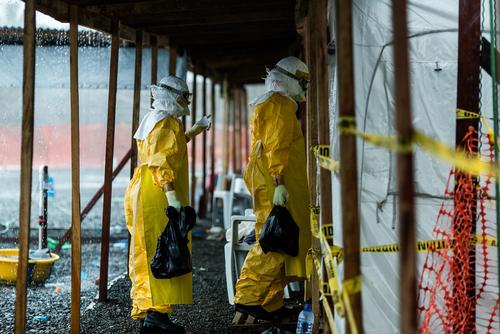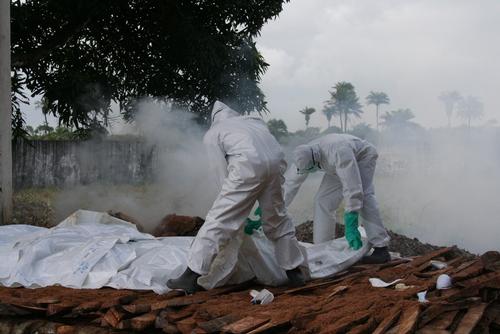Speech given by Jackson Naimah, a team leader at MSF's Ebola treatment centre in Monrovia, Liberia, to the UN Security Council in New York, describing the urgent need to address the Ebola crisis in the region.
I wish to thank Ambassador Power for inviting my organization, Médecins Sans Frontières, to address this gathering of nations who can help my people, my country, and my region.
I am honored to represent MSF. We welcome President Obama’s Ebola response plan and hope for its immediate implementation. We also call upon all member states of the United Nations to similarly mobilize their capacities. With every day that passes, the epidemic spreads and destroys more lives.
I first heard about cases of Ebola in March. Soon after, the disease came here to Monrovia. From then on, people began dying.
My niece, Francila Kollie, and my cousin, Jounpu Lowea, both nurses, became infected at work. While they were able to receive treatment, they died in late July. So many of my close friends, university classmates, and colleagues have also died in recent months.
Since I have a medical background, I felt it was my responsibility to help my country.
I am a team leader in MSF’s treatment center in Monrovia. I have worked in the triage, assessing patients prior to admission, in the suspected cases tent, and with patients confirmed to have Ebola. Because there is no cure, we provide supportive care to patients, in the form of food, hydration, and basic treatment of symptoms. If treated early enough, their chances of survival are much better.
I cannot stand aside and watch my people die. But I, along with my colleagues here, cannot fight Ebola alone.
You, the international community, must help us.
I wish to illustrate the battle we face.
We have seen so many patients die. And they die alone, terrified, and without their loved ones at their side. As a medic, one must have a different way of coping. When I go inside the treatment center, I keep my focus on what the patients need. We try to attend first to those who are weaker, those who need more help to eat and drink, or those who need to speak to one of our counselors because they are so traumatized and frightened.
We are trying to treat as many people as we can, but there are not nearly enough treatment centers and patient beds. We have to turn people away. And they are dying at our front door.
Right now, as I speak, people are sitting at the gates of our centers, literally begging for their lives. They rightly feel alone, neglected, denied – left to die a horrible, undignified death.
We are failing the sick because there is not enough help on the ground. And we are failing those who will inevitably become infected, because we cannot care properly for the sick in safe, protected environments and prevent the spread of the virus.
One day this week, I sat outside the treatment center eating my lunch. I saw a boy approach the gate. A week ago his father died from Ebola. I could see that his mouth was red with blood. We had no space for him. When he turned away to walk into town, I thought to myself that this boy is going to take a taxi, and he is going to go home to his family, and he will infect them.
On my night shift this week, I saw a patient who had driven for around 12 hours in an ambulance because there was no other treatment center.
We urgently need to get the disease under control, and we need your help.
We need what is referred to as contact tracing, to follow up every person who has been in contact with someone who is sick with Ebola or has died from the virus. We need to raise awareness about this disease, because there has been so much denial, even now, and despite the international attention.
We need more care centers, so that everyone can find a bed and not have to stay at home and risk infecting their families. We need to get our medical staff trained in proper procedures so they can keep the centers running. We also need to get health services running, and to make sure that it is safe for health staff to go to work. We have seen too many health workers and ambulance drivers come into our centers as patients, facing the same fate.
So please send your helicopters, your centers, your beds, and your expert personnel. But know that we also need the basics. There are still homes in Monrovia that do not have soap, water, and buckets. Even these simple things could help curb the spread of the virus.
Ebola has affected every aspect of our lives. Schools and universities have shut down, along with civil services.
I feel that the future of my country is hanging in the balance.
My wife works at JFK Hospital here in Monrovia. We are educating our children to protect themselves so that they will survive. As children of health workers, they can be an example to their peers.
I also ask you to be an example to your peers, as nations with the resources, assets, and skills required to stop this catastrophe.
We do not have the capacity to respond to this crisis on our own. If the international community does not stand up, we will be wiped out.
We need your help. We need it now.
Thank you.






